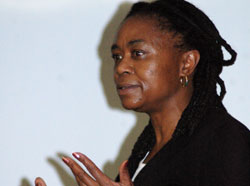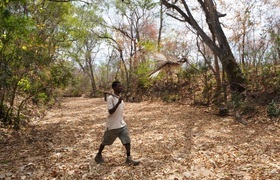Embedding social responsiveness in academic work
18 May 2007 | Story by Myolisi Gophe
Reaching Out: Dr Nokuthula Shabalala speaks at the Social Responsiveness Colloquium, the university's first, on 16 May
The presentations and debates were different in nature but had one thing in common - they showed what UCT does to try and improve the quality of life in broader society.
The question on the table at the university's first Social Responsiveness Colloquium, as Professor Frank Horwitz, chairperson of the Social Responsiveness Working Group, put it, was to what extent does the academic work of UCT work impact on South African communities?
At the colloquium, held on 16 May, staff and students had the opportunity to present insights on their work covered in the 2006 Social Responsiveness Report, and how it responded to varied needs in South African society.
Dr Nokuthula Shabalala, speaking on the work of the Child Guidance Clinic, explained that they encourage students to work with communities and engage them in policy and in practice.
The clinic set out to bridge the gap between the university and communities, said Shabalala, and produce new crops of psychologists who are committed to all citizens, not just those who can pay private practice fees.
"We want to include qualified practitioners in our drive for transformation," she said.
The aim of the colloquium was to, among other things, promote debate and to foster communities of practice for social responsiveness within UCT.
 This work is licensed under a Creative Commons Attribution-NoDerivatives 4.0 International License.
This work is licensed under a Creative Commons Attribution-NoDerivatives 4.0 International License.
Please view the republishing articles page for more information.










